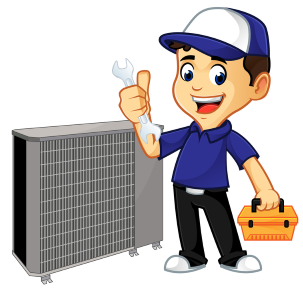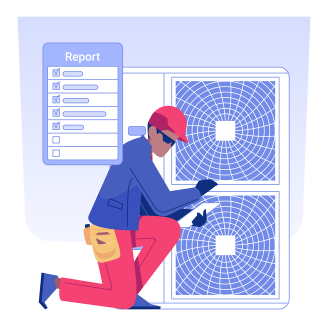Heating, and air conditioning (HVAC) systems are essential in providing comfortable, safe, efficient living spaces. Many people are not aware that over time HVAC systems become outdated, inefficient, and costly to repair. When this happens, it is time to replace your HVAC system. However, most people really do not know when a system needs to be replaced and they wait until the moment it stops working. Which happens exactly when it is the most inconvenient for the client, in the heat of summer and on holidays. New HVAC system costs can vary depending on the type of system, efficiency chosen, installation factors, season, and maintenance requirements. In this article, we will explore the costs of HVAC replacement, what customers should be aware of, and the risks and warnings they should keep an eye on.
HVAC system costs can vary depending on several factors, including the type of system, efficiency chosen, sound decibels, installation factors, and maintenance requirements. According to HomeAdvisor, the average cost of a new HVAC system in the United States is around $5,500, but costs can range from $3,000 to $10,000 or more. Of course we all know that the cost of living in California and in Nebraska are different, so is the type of equipment used in each state, and this also can create differences in price. Home Advisor looks at National averages. But, it is important to ask,” Is the average for a 2 ton system in Nebraska or for a 5 ton system in Los Angeles?”. They are very different. The cost of an HVAC system replacement may include several elements such as the cost of the equipment, type of equipment chosen, ease of the installation, ductwork, permits, and disposal fees.
The Cost of HVAC System EquipmentThe cost of equipment is one of the primary factors that can impact HVAC replacement costs. The type of system, size, and brand can all impact the overall cost of the equipment. High-end HVAC systems with advanced features will typically cost more than standard models. For example, a high-end air conditioner with advanced features may cost significantly more than a standard model. What is a high -end system you may be asking? A high seer, which is high efficiency system is considered a high-end system because they are built with superior technology that uses lower amperage of electricity, saving clients money and they are usually quieter. |
 |
Installation costs are another factor that can impact HVAC system costs. The cost of installation may depend on the complexity of the installation, the size of the system, and the location of the unit. Additional costs may include permits for installation, disposal fees for old equipment, and ductwork modifications or replacement. These costs can add up quickly and significantly impact the overall cost of HVAC replacement. Most importantly for you to know is, are the people installing professionals?
Are they covered with general liability and workers compensation? If not the price you may end up paying will be a lot more. And lastly, there are many contractors that install using short cuts that unfortunately no one will ever know about, until it is too late to fix. After a few years the system suddenly stops working and this is when the client finds out. For example- Make sure when your system is replaced that the installation team does a flush out of the line set with Nitrogen – In industry terms, we call it a Nitrogen purge.
 |
The Cost of MaintenanceCustomers should also consider the cost of hvac maintenance when replacing their HVAC system with a new one. HVAC systems require regular maintenance and filter changing to ensure that they operate efficiently and safely. Neglecting maintenance can result in higher energy bills, decreased system performance, and potentially can destroy a system. Customers should factor in the cost of maintenance when considering HVAC replacement costs. |
Before deciding to replace an HVAC system, customers should be aware of several factors that can impact the cost of the project. First, customers should consider the size and layout of their home. This can impact the size of the system needed, which will impact the overall HVAC System cost. Customers should also consider the energy efficiency of their current system and the potential energy savings from a replacement.
Customers should be aware that a higher efficiency system may have a higher initial cost but can save them money in the long run-on utility bills. Another factor customers should be aware of is the reputation and experience of the contractor they choose. The contractor should be licensed, insured, and have a good reputation for quality workmanship.
Replacing an HVAC system can be a significant investment, and customers should be aware of potential risks and warnings associated with the project. One potential risk is the possibility of unexpected costs. These can arise if there are unforeseen installation challenges or if the system needs additional modifications or repairs. Customers should also be aware of the potential for scams or dishonest contractors who may provide low quotes but deliver poor workmanship or use subpar equipment.
Another warning is that improper installation can result in decreased system efficiency, increased energy costs, and potential safety hazards. This is why it is crucial to choose a reputable contractor who has experience in HVAC system replacement. Customers should also be aware of warranties and guarantees provided by the contractor and manufacturer. These can provide peace of mind and protection in case of any issues with the new system.
Customers should also be aware of the importance of proper maintenance for their new HVAC system. Regular maintenance can help extend the system’s lifespan and ensure it operates efficiently. Neglecting maintenance can result in higher energy bills, decreased system performance, and potential safety hazards. Therefore, customers should budget for ongoing maintenance costs to ensure the system performs well over its expected lifespan.
Several factors can impact HVAC replacement costs. The first factor is the type of system that needs to be replaced. For instance, a central air conditioning system will cost more to replace than a single room unit. Customers should consult with HVAC professionals to determine which type of system best suits their needs and budget.
Another factor that can impact HVAC system costs is the size of the unit needed. A larger system will typically cost more than a smaller system. Customers should ensure that the system they select is the appropriate size for their home or building to avoid overspending on equipment and installation costs.
Installation factors can also impact HVAC replacement costs. For example, if the system requires extensive ductwork modifications or replacement, this will increase the overall cost of the project. Customers should also consider the complexity of the installation and the location of the unit, as these factors can impact installation costs.
The reputation and experience of the contractor can also impact HVAC replacement costs. A reputable contractor may charge more for their services, but their expertise and quality of workmanship can provide customers with peace of mind and a well-performing HVAC system.
In conclusion, HVAC system costs can vary widely depending on several factors, including equipment, installation, and maintenance requirements. Customers should be aware of these factors and obtain multiple quotes from reputable contractors before deciding on an HVAC replacement project. By being informed and taking the necessary precautions, customers can ensure a successful and cost-effective HVAC system replacement.